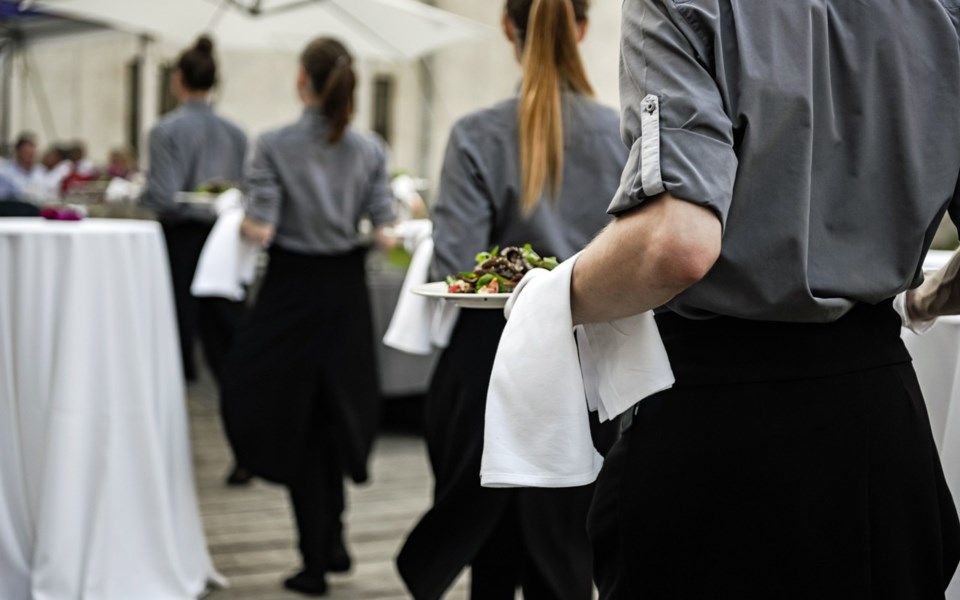the general manager of the Fairmont Chateau Whistler said the hotel agreed to retroactively pay thousands of dollars to banquet staff as a good-faith gesture following a complaint from an employee and the involvement of one of B.C.'s largest unions.
The Fairmont said it agreed to the settlements after it became clear that, for several weeks last year, it was not in compliance with changes to the Employment Standards Act that went into effect in the spring. This led to a formal complaint filed by the United Food and Commercial Workers (UFCW) Local 1518—but the hotel asserted that gratuities were never withheld from staff.
According to the union, a banquet worker contacted the UFCW in 2018 after he said hotel management introduced a new tipping structure in which 20 per cent of guest gratuities were withheld and used to subsidize catering services management's wages, a contravention of the employment act.
"What I mostly wanted was clarity, because before I even went to the union, the gratuity pool was always this arbitrary number," said former banquet server Elliot, who requested his last name be withheld to protect his future job prospects.
"Once they started giving me information, I realized that what they were doing wasn't legal, that they weren't going to do anything about it and we had no power."
But according to Fairmont GM Norm Mastalir, gratuities were never decreased or withheld from staff. Rather, he said, the hotel was initially unaware of changes last May to the Employment Standards Act that required businesses to communicate with clients how service charges would be divvied up.
In the Fairmont's case, Mastalir said the guest surcharge includes portions earmarked for "administrative purposes" and gratuities—the latter having already been paid out to staff. For a period of roughly seven weeks following changes to the act, however, Mastalir said the Fairmont failed to properly list how much of that surcharge would be retained for administrative costs and gratuities.
"We felt that the most expedient way to resolve that issue was to simply pay out the administrative portion of the surcharge for the period that we were non-compliant," said Mastalir, adding that "at no time" were workers' tips impacted.
"Our colleagues have always been crystal clear on how much of the surcharge comes to them as a gratuity."
Because the Fairmont settled with employees, there will be no ruling—and possible associated penalties—stemming from the Employment Standards Branch (ESB) investigation.
Stephen Portman, union rep for the UFCW, disagreed with the Fairmont's assertion that its non-compliance was due to changes in how it communicates its service charges to guests.
"It is in the view of the union that this was pretty clearly a wrongful redistribution of the tips given that they were not being paid to the workers on the floor doing the work that a guest of the space, who is paying for the space, would reasonably expect to receive the gratuities," he said.
"It hasn't been the position of the union that the error was in the language involving a contract with customers or users of their space. That's all news to me."
In a release last week, the UFCW—which tried and failed last year to organize the Fairmont's banquets department after employees voted it down—said the hotel had agreed to pay back roughly $85,000 in tips owed to around 60 banquet staff. Mastalir declined to comment on the total settlement amount and the number of affected banquet employees, citing privacy concerns. He did acknowledge, however, that the legislative changes impacted more than just the banquets department and that other settlement payments would be made.
"This issue affects a lot of departments in the hotels; anywhere we have a surcharge, including the bell department, housekeeping department, stewarding, kitchens," he said.
Mastalir said he has "no knowledge" of the tipping structure at other Fairmont locations in B.C., but he assumes there would be a similar system in place.
Although tip pooling is still allowed, as of last spring, employers in B.C. are no longer permitted to withhold or deduct worker-earned gratuities.
Eric Griffith, president of the Restaurant Association of Whistler, declined to comment on whether the practice persisted in the resort's foodservice sector, saying the organization representing more than three dozen resort restaurants "doesn't have enough information" to do so at this time.
Saad Hassan, president of the Hotel Association of Whistler, did not respond to a request for comment.
The UFCW has been active in Whistler since at least early 2018, when a group of Whistler Blackcomb (WB) ski instructors approached the union. Most recently, the UFCW has been assisting WB's snowmaking department, which on Jan. 7 applied to formally unionize.




